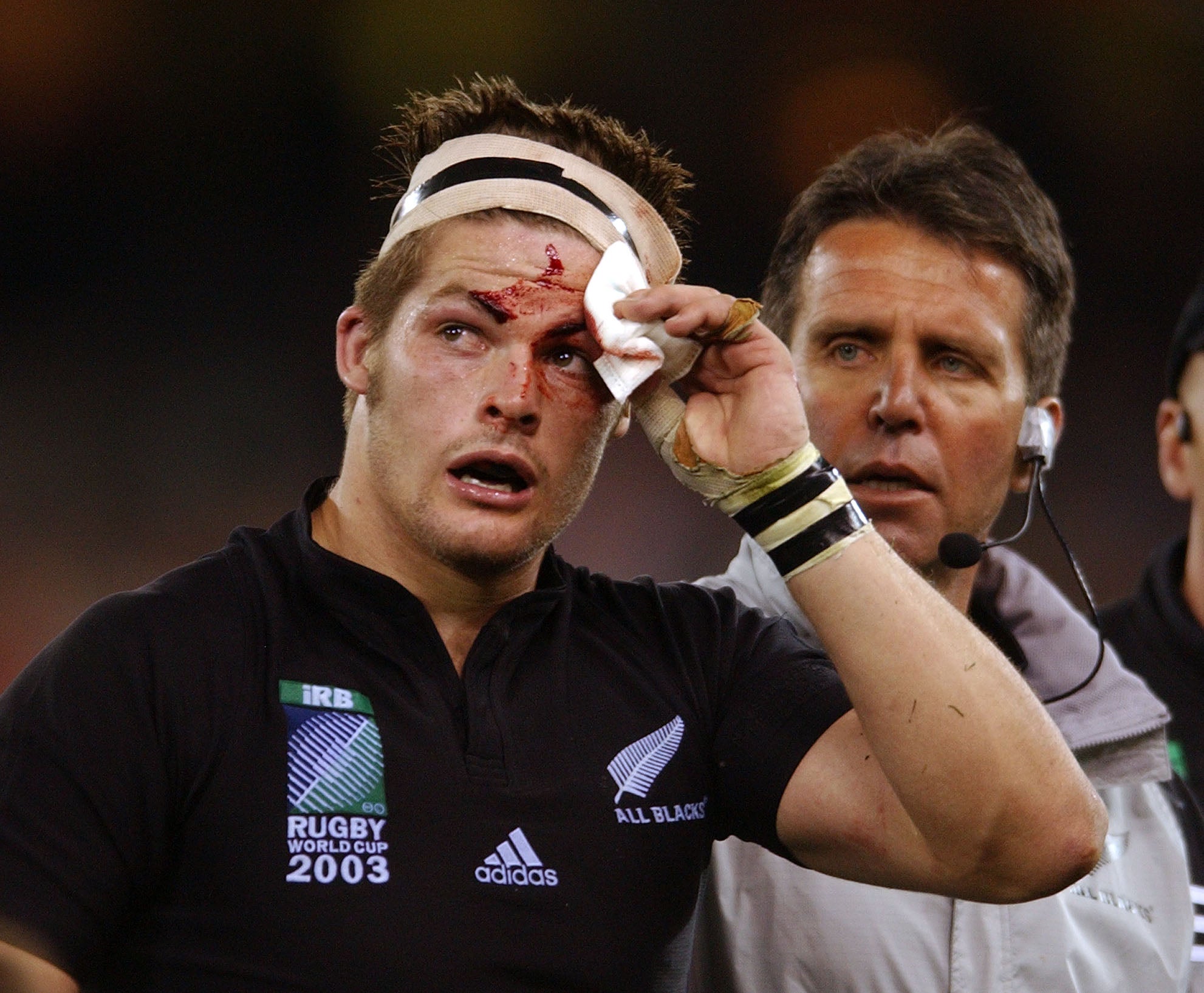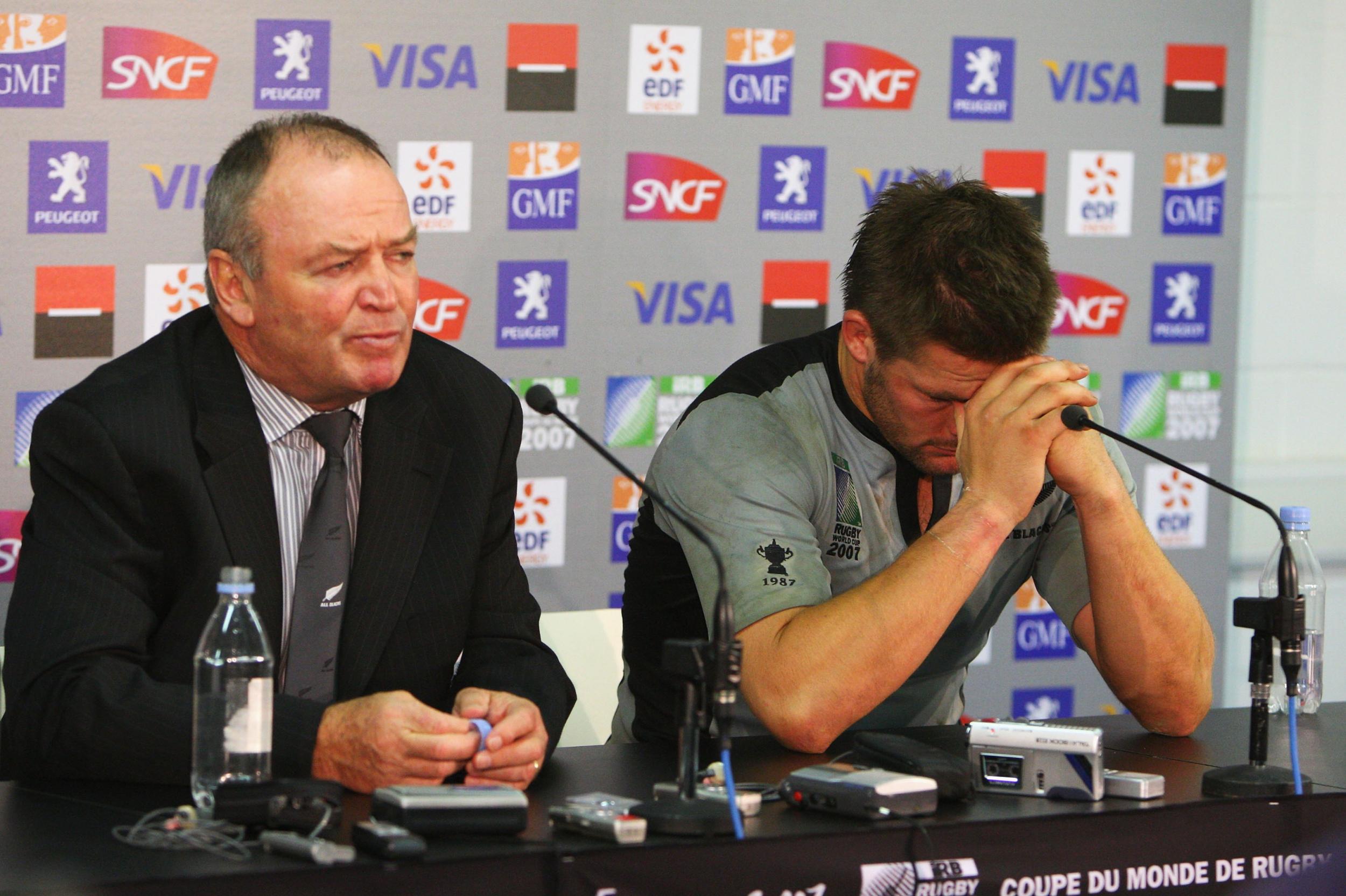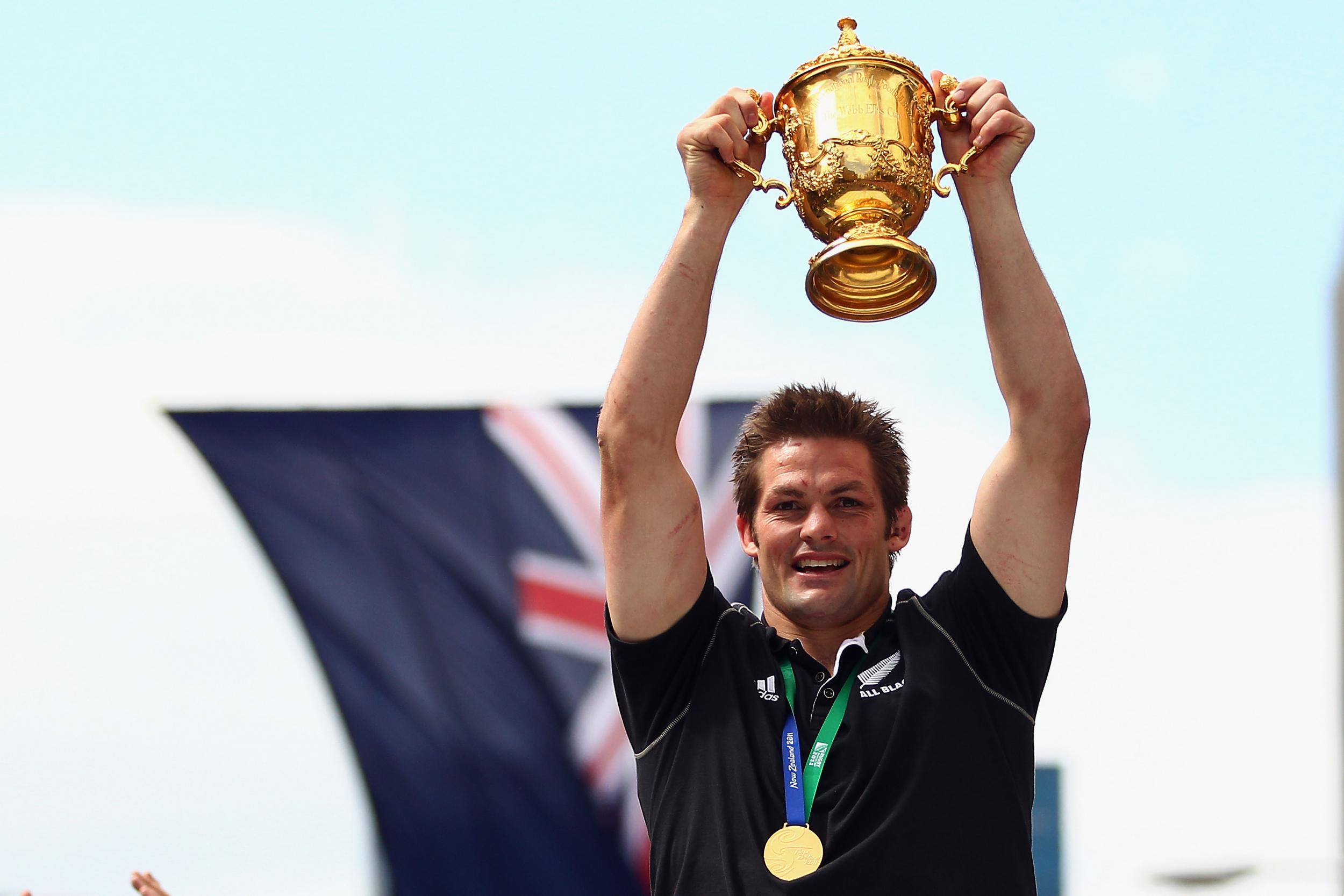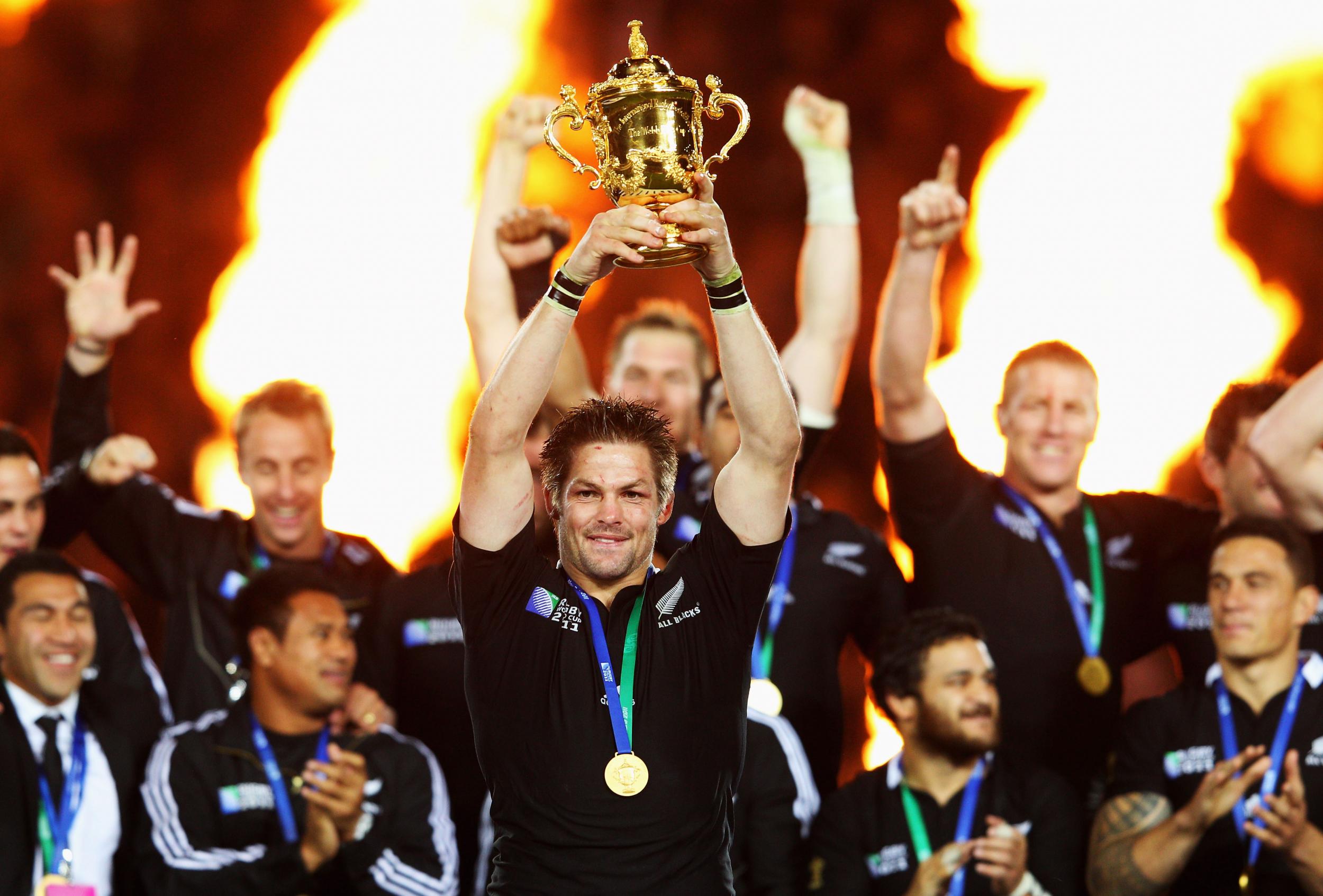Rugby World Cup 100 greatest players: A journey back through the career of Richie McCaw, simply the best
Exclusive interview: The only man to win the Rugby World Cup twice as captain, unite a nation in tragedy and leave a lasting impression on the game he gave so much to, McCaw has been voted the greatest player in World Cup history. Here’s his story

Your support helps us to tell the story
From reproductive rights to climate change to Big Tech, The Independent is on the ground when the story is developing. Whether it's investigating the financials of Elon Musk's pro-Trump PAC or producing our latest documentary, 'The A Word', which shines a light on the American women fighting for reproductive rights, we know how important it is to parse out the facts from the messaging.
At such a critical moment in US history, we need reporters on the ground. Your donation allows us to keep sending journalists to speak to both sides of the story.
The Independent is trusted by Americans across the entire political spectrum. And unlike many other quality news outlets, we choose not to lock Americans out of our reporting and analysis with paywalls. We believe quality journalism should be available to everyone, paid for by those who can afford it.
Your support makes all the difference.“Ah great,” says Richie McCaw. The former All Blacks captain has just been told that he has come out on top in a vote to decide the greatest player in the history of the Rugby World Cup. No theatrics, no hullaballoo, just another thing to take in his stride. “Good stuff,” he adds.
By all accounts it is just another day for Richie McCaw, the helicopter pilot. When we speak, McCaw is preparing for work just like any other day. In a month’s time, he will head to Japan for the Rugby World Cup, but for the first time in 20 years, it will be a tournament without him.
The discussion for once is not about the All Blacks, or who will win the World Cup. It is about him, because in our countdown of the top 100 players to have graced the Rugby World Cup, McCaw emerged as the greatest.
“It’s a bit different to four years ago, and the time before that,” McCaw tells The Independent. “But it’s quite nice to be able to think, sit back and look and go ‘wow that World Cup is pretty open’ and not have the nervousness of ‘have I got everything sorted?’ It’s nice to sit and actually watch and I’m looking forward to watching it because I think it’s quite wide open this one.”
They weren’t that wide open during McCaw’s time, at least during the second half of his career, that’s for sure. For more than two decades, the All Blacks failed to deliver on their potential as the best team on the planet, and incredibly the best they had to show across five World Cups was one single final appearance in the 1995 defeat.
This is the Richie McCaw story, told by the man himself.
For McCaw, his emergence onto the international scene came in the run up to the 2003 event.
“If I’m honest I probably didn’t 100 per cent understand how big and different a World Cup can be. That was my second full season at international level and the first year had gone ok, and similarly the Tri Nations leading up to the World Cup in Australia had gone pretty smoothly.
“So I was just thinking we’d roll into a World Cup and it’ll be exciting and we’ll go see if we can win it. It was exciting, but I probably didn’t have the realisation of what it takes.”
Two things went against the All Blacks 16 years ago. One, as McCaw explains, was the failure to adequately prepare for the road that lay ahead. The second, and much more prominent reason, was the schedule. New Zealand didn’t face the trickiest of pools with Italy, Canada, Tonga and Wales joining them. But the Wales game came last, and it didn’t exactly go their way.
Early in the second half, New Zealand found themselves 37-33 behind and locked in a humdinger of a match. “That was a hell of a match,” says McCaw. “When I look back, we ended up scoring 53 points but midway through the second half they were only a bit behind on the scoreboard and we’d both scored 30-odd in an open and fast game of footy, and I just remember thinking ‘wow’.”
The problem came in that the ensuing quarter-final came against the Springboks, who had been beaten by England in the pool stage and found themselves in New Zealand’s way as a result. “We were really up for that game because with the South Africans it’s a big challenge and you don’t want to go home in a quarter-final – no one wanted to do that. So we had a massive game, and I thought we played really well, we were really physical, all of those sort of things.” But going back to back in energy-sapping encounters had taken its toll.
“It’s the old story of sport, you’ve got to be able to back that performance up with the next one,” says McCaw as he recalls the semi-final against Australia. “There were a couple of key plays early in the game and a 14-point turnaround with the intercept from Mortlock which they got and they took. We missed that opportunity early probably through the eager defence. Straight away we missed those opportunities and the Aussies got their noses ahead and we just couldn’t get back into the game – I don’t think through a lack of trying but they just did really well.”

When New Zealand fail at the World Cup, the ramifications are felt at home. The All Blacks had at least made it to the last four, and gone out of the competition to what was the best Australian side seen in the last 20 years, so for McCaw, the pain and agony wasn’t too bad.
“I was only 22 and I suppose from a selfish personal point of view I felt like I’d played reasonably good rugby throughout that year and within that tournament, so it probably didn’t … it wasn’t such a big deal as it perhaps was the following World Cup.”
It wasn’t just McCaw who had that feeling. John Mitchell, then the head coach, was sacked, and Graham Henry was brought in that gave the All Blacks the feeling of a fresh start. With this appointment disappeared the accountability for the 2003 failure on behalf of the players, and although McCaw was appointed captain and a Lions series whitewash followed, the lessons hadn’t been learnt.
The onset of professionalism in rugby union had taken its time to make a real impact in New Zealand, but by 2007 the All Blacks were starting to really feel the positives. Players were managed through the Super Rugby season to reach the World Cup in peak fitness, the Kiwis had been the pacesetters on the global stage for the last three seasons, and they looked a safe bet for the World Cup in France.
But that Gallic thorn in New Zealand’s side returned. Eight years after the remarkable World Cup semi-final, the French pulled off yet another upset over the All Blacks in Cardiff.
“We got through the pool and we hadn’t had any real challenges and I guess we were looking at it like ‘to win this thing you’ve got to win three knockout games’.
“The reality is that you can’t look past one game and that’s the quarter-final. You play that like a final, and then you have another chance, whereas if you have any thoughts about that knockout game you find yourself in a bit of trouble and that’s one of the reflections that we had.”
Much of that result resided in the All Blacks’ failure to contain replacement Frederic Michalak. “I sometimes think we tried to plan for everything, like we expected it all to be perfect if you know what I mean? And sometimes when you adapt to when things don’t go your way or when Freddie comes on, you’ve got to be able to adapt.
“It was one of those things where perhaps we’d been in those situations in the past and someone or the team has always found a way to do something to get the points you needed. But as the game got tighter and the scoreboard runs up as the clock runs down, you start to think about it: ‘oh we might not get there’.
“That starts to make people do funny things like you try and do it all on your own, there were little bits of that, and then things like taking drop-goals of whatever, we didn’t really discuss that to the point that you needed to and when you’re in a knockout game and need to find three points, you need to think about how you’re going to hold on in there and find a way to win.
“We just perhaps assumed that what we’d done in the past was going to be good enough and it wasn’t though a lack of trying – and the French had the belief too. When they got on top of us and had the momentum, it’s difficult to actually get that back. Things like that that you perhaps take for granted, but we hadn’t really addressed.”
The response back home, this time, was seismic, to the point that the New Zealand economy crashed. McCaw copped plenty of criticism, with his leadership heavily questioned and calls for both him and coach Henry to fall on their sword. “The New Zealand Rugby Union made a brave decision to stick with the coaches for another period and I guess I was lucky to get another crack as well,” he remembers.
But six years after his international debut, and eight away from retirement, McCaw had reached a turning point. The foundations of what was to come were laid in the very aftermath of that World Cup failure.
“It was certainly the management’s and the senior players’ problem of how to deal with a World Cup when the heat comes on. I guess that forced us to have a look at us.
“There was no hiding behind it being someone else’s problem, it was like ‘right, we have to look pretty deeply at what we didn’t get right and what we need to change and what we need to work on’. That was four years work and that wasn’t just thinking about the 2011 World Cup. It was looking away from the campaign and looking at what you wanted and needed to be better at, and a lot of it wasn’t the playing, it was when the pressure points come, what have you done to ensure you can handle it?”

If pressure was the issue for the All Blacks, then a home World Cup would be the last thing they would’ve wanted to see on the horizon. The pressure of wearing the silver fern ramps up at home, where under no circumstances is it acceptable for the All Blacks to lose. So what did McCaw do? He turned it into a positive.
“We reframed it a little bit,” he explains. “People talk of the extra pressure of playing at home and in front of your own fans, but we turned it around and said ‘well if you wanted to play somewhere, why wouldn’t you want to play at home in front of your fans?’
“It was great when we did that, you love playing at home and we were lucky we got the opportunity to do that, so we tried to refocus it that way, and then people would say ‘what if you don’t win this one?’, we would go straight back at them and say ‘but what if we do?’”
The All Blacks were also having to carry the hopes of a nation trapped in tragedy. The 2011 Christchurch earthquakes decimated McCaw’s home town, killing 185 and leaving thousands homeless in a city that still shows the impact of the natural disaster today. Suddenly, the All Blacks had to bring the feel-good factor back to the entire country, not just the rugby fans.
But the ultimate test of that came in how New Zealand coped with the loss of world class fly-half Dan Carter – and then his replacement Colin Slade, and his replacement Aaron Cruden – leaving them with a fourth-choice option in Stephen Donald. In circumstances that could easily faze other players – good players at that – McCaw just made it as simple as possible. Donald had played more than 20 Tests by that point of his career and knew what he was doing, so his skipper welcomed him into camp, and told him: “right you’re in charge of running that ship as our No 10 and we’ve got full faith in you. If you need me to do anything to help just say, but get on with it.”

It worked. Donald kicked the match-winning penalty in the final, and 24 years of World Cup heartache had finally come to an end.
“It was pure relief to be honest. The first thought when the final whistle went was ‘I’m meant to be happy?’ but I was just so relieved. Then the excitement came a wee bit later but it was like ‘ooph thank goodness’.”
From that point on, McCaw’s All Blacks went into overdrive. The flanker won 41 of the 46 games he played in between World Cup finals, losing just three match at a win ratio more than 89 per cent.
“A lot of the work had been done and we were ready,” he says. “We’d obviously had a good period up to that point, but that didn’t count for anything. To achieve what we wanted to, to get to the right spot, the guys were excited by the chance to do something that no other team had done, to go and win it again.
“From a personal point of view I knew it was going to be a last crack at international rugby, so I wanted to make sure we did it right.”
The All Blacks did exactly that, making World Cup rugby look easy to the point that the only time they looked in real danger was the semi-final against the Springboks.
“There was a couple of key moments – we stole a lineout and DC [Carter] got a drop-goal at a pretty key time – there were things like that and it just came down to holding our nerve. I thought all of our guys did a pretty good job of that with reasonable control, and even though it may not have looked like it towards the end of the game, it felt like we were the ones who were giving the pressure and they were in that mode where you’re waiting for a mistake to get an opportunity, and we managed to not give them one.”
New Zealand did not score a single point in the final quarter of the semi-final, with Pat Lambie’s 68th-minute penalty closing the lead to just two points. But where they had faltered before, the All Blacks displayed the mental resilience that defined McCaw: take it in their stride, do what they wanted to do and above all, keep a calm head on.

Somehow New Zealand came up against a rejuvenated Australia side who had seen off England, Wales, Scotland and Argentina, but the Wallabies were never really a match for their great rivals.
“We had the Wallabies on the ropes in the second half, and to their credit they hung in there.” Australia scored two quick tries to make a contest of it, but New Zealand pulled away in the closing stages and as the old guard of McCaw, Carter, Non et al prepared to bow out, the new guard emerged with Beauden Barrett scoring the final try of the match. “It was one that we didn’t want to finish because it was fun at the end,” remembers McCaw. “We were enjoying ourselves, and we’d gone from four years earlier from just hanging in there and surviving to actually loving it and wishing it wouldn’t end.
“In my mind I knew that was going to be my last game, but I didn’t shut the door just in case because I didn’t know what was going to happen and I didn’t want to make any big calls.
“I remember this distinct feeling as soon as the final whistle went thinking ‘wow that’s it, it’s done’, and for a brief moment I thought it was disappointing that this was going to be it, but then actually it was ‘just enjoy this’.
“I reflected afterwards that it was the perfect time to finish. Maybe I could’ve played on a bit longer but I knew that while I’d never get sick of playing it was becoming harder and harder to get yourself to the point of being able to perform like that every week. It was just the right time for the team, me and everyone and the last game of rugby being a World Cup final at Twickenham that you win is not a bad way to finish.”

It signed off what has been voted the greatest career of any player at the World Cup, according to our countdown, and in a fitting way to crown it, McCaw was the man to display the Webb Ellis Cup at the opening ceremony for Japan 2019. The cup doesn’t belong to any one individual, but if it did, it should probably be Richie’s.
Join our commenting forum
Join thought-provoking conversations, follow other Independent readers and see their replies
Comments